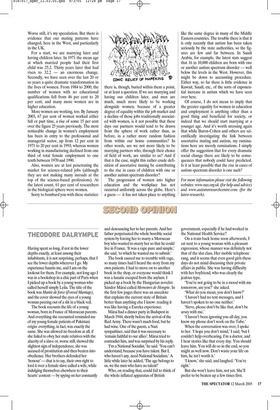SECOND OPINION
THEODORE DALRYMPLE
Having spent so long, if not in the lower depths exactly, at least among their inhabitants, it is not surprising, perhaps, that I see the lower depths wherever I go. My experience haunts me, and I am on the lookout for them. For example, not long ago I was in a bookshop in a chic part of Paris when I picked up a book by a young woman who called herself simply Leila. The title of the book was Mariée de force (Forced Marriage), and the cover showed the eyes of a young woman peering out of a slit in a black veil.
The book recounts the life of a young woman, born in France of Moroccan parents. And everything she recounted reminded me of my young female patients of Pakistani origin: everything, in fact, was exactly the same. She was allowed no freedom at all; if she failed to obey her male relatives with the alacrity of a slave or, worse still, showed the slightest sign of independence, she was accused of prostitution and then beaten into obedience. Her brothers defended her ‘honour’ — that is to say, their own right to lord it over a female slave called a wife, while indulging themselves elsewhere to their hearts’ content — by spying on her constantly and denouncing her to her parents. And her father perpetuated the whole horrible social system by forcing her to marry a Moroccan boy who wanted to marry her so that he could live in France. ‘It was a rape pure and simple,’ she said, ‘to which he wanted me to submit.’ The book caused me to tremble with rage, so many times had I heard the story from my own patients. I had to move on to another book in the shop, or everyone would think I was a lunatic escaped from the asylum. I picked up a book by the Hungarian novelist Sándor Márai called Memoires de Hongrie. In the first few pages there was an anecdote that explains the current state of Britain better than anything else I know: reading it was like having a Eureka experience.
Márai had a dinner party in Budapest in March 1944, shortly before the arrival of the Red Army. There wasn’t much food, but he had wine. One of the guests, a Nazi sympathiser, said that it was necessary to ‘remain faithful to our allies’. Márai tried to contradict him, and was surprised by his reply.
‘I’m a National Socialist,’ he said. ‘You can’t understand, because you have talent. But I, who haven’t any, need National Socialism.’ A little while later he added, ‘The age belongs to us, we the men who have no talent!’ Who, on reading that, could fail to think of the whole inflated apparatus of British government, especially if he had worked in the National Health Service?
On a train back home soon afterwards, I sat next to a young woman with a pleasant expression, whose manner was definitely not that of the slut class. Her mobile telephone rang, and it seems that even good girls these days do not mind discussing their private affairs in public. She was having difficulty with her boyfriend, who was clearly the jealous type.
‘You’re not going to be in a mood with me tomorrow, are you?’ she asked.
‘What do you mean, you don’t know?’ ‘I haven’t had no text messages, and I haven’t spoken to no one neither.’ ‘Steve, please don’t be like that, don’t be arsey with me.’ ‘I haven’t been ignoring you all day, you know my phone don’t work on the Tube.’ When the conversation was over, I spoke to her. ‘I hope you don’t mind,’ I said, ‘but I couldn’t help overhearing. I’m a doctor, and I hear stories like that every day. You should leave him. You will do so in the end, so you might as well now. Don’t waste your life on him, he isn’t worth it.’ ‘I know,’ she said, and laughed. ‘You’re right.’ But she won’t leave him, not yet. She’ll prefer to be beaten up a few times first.
































































 Previous page
Previous page